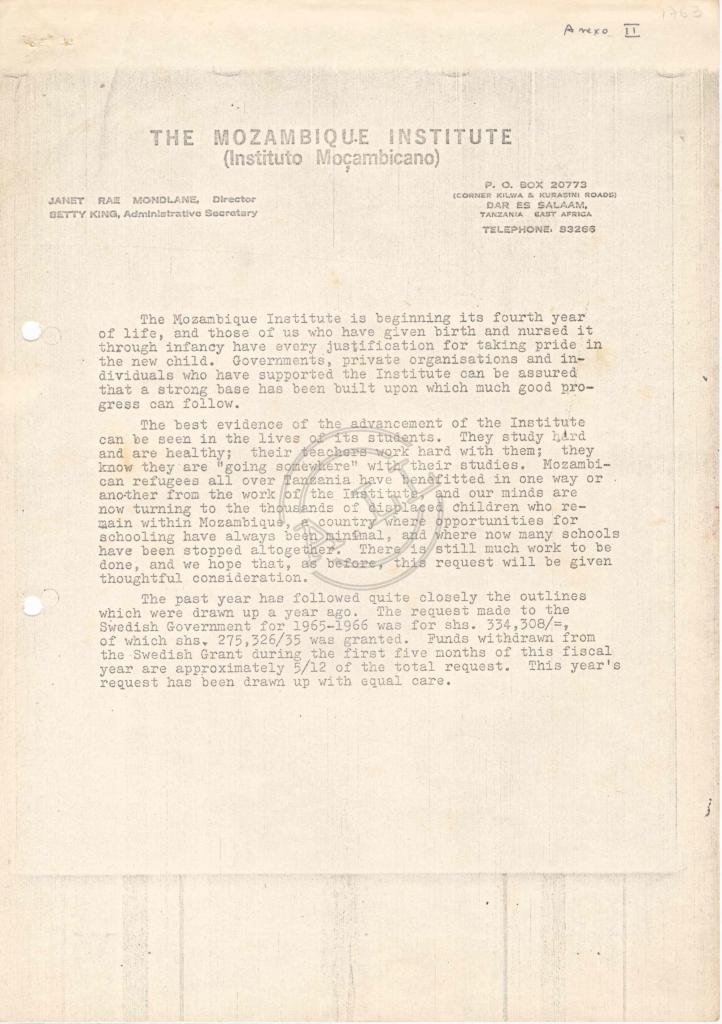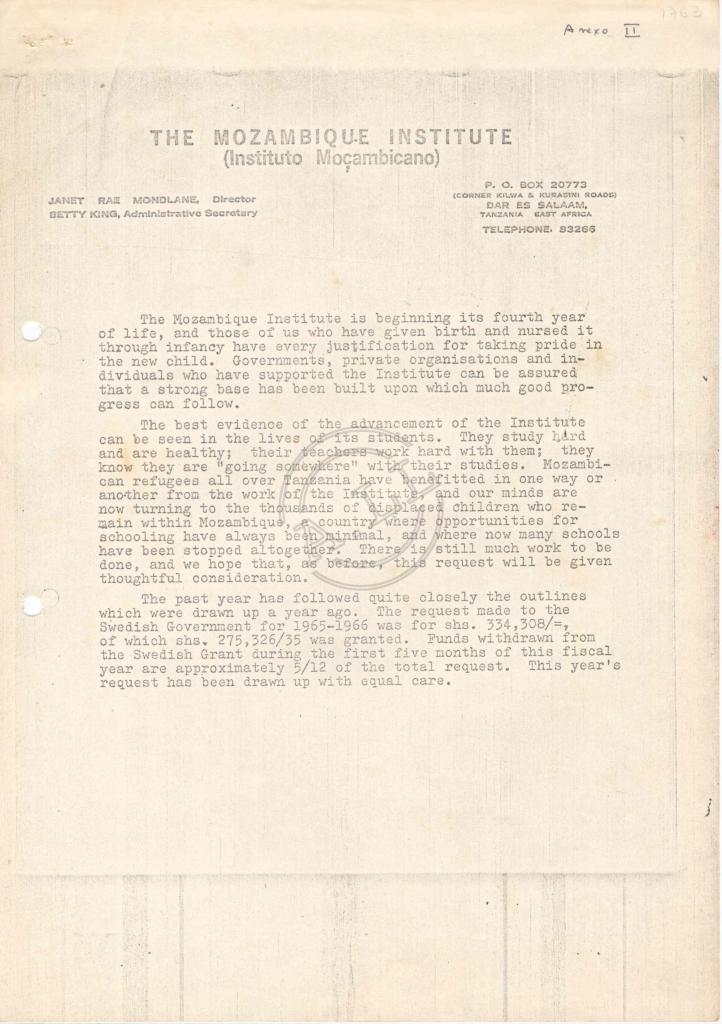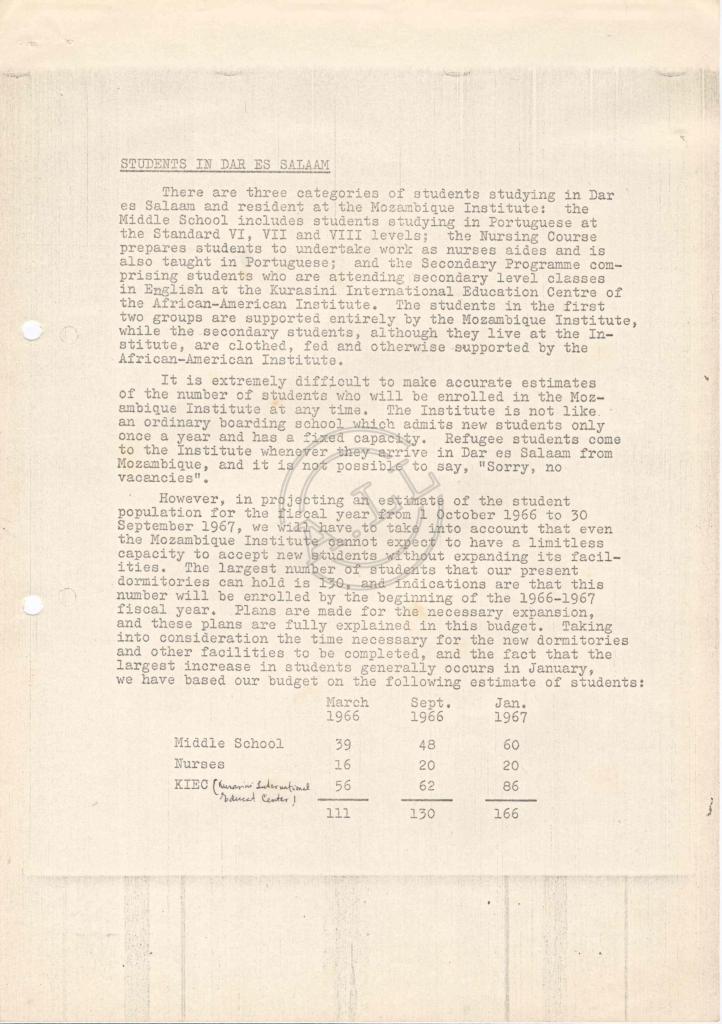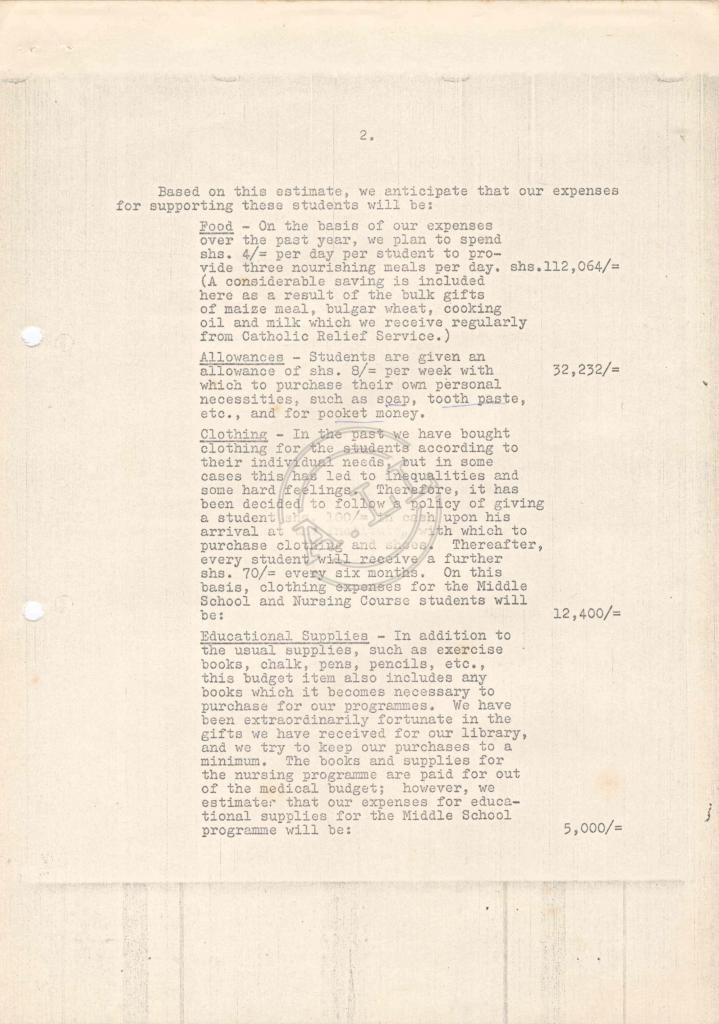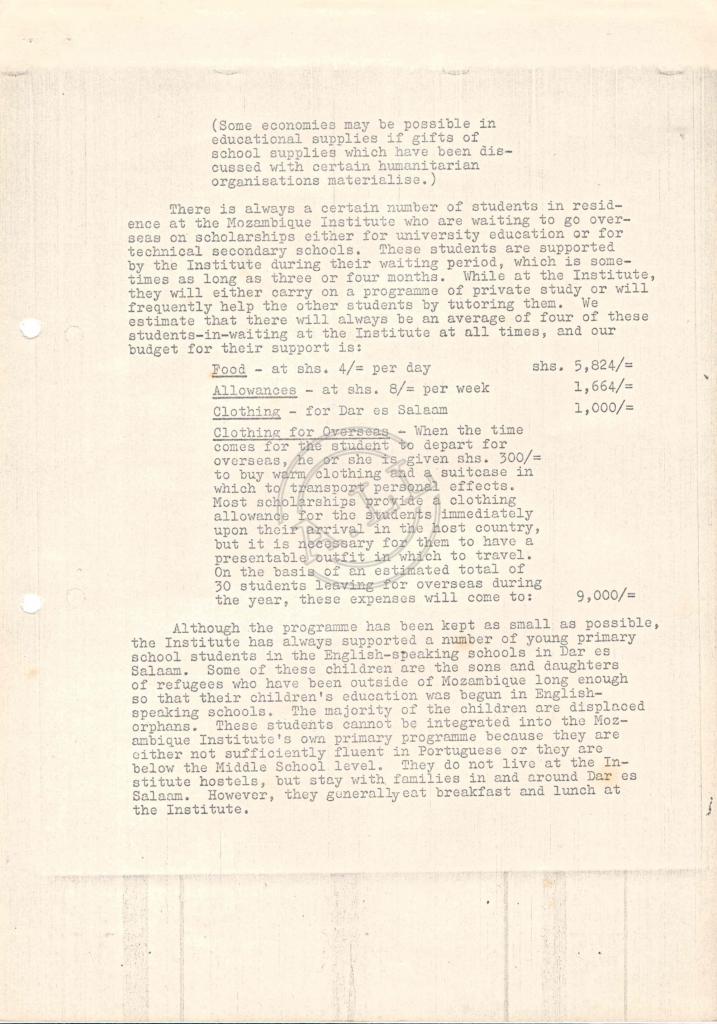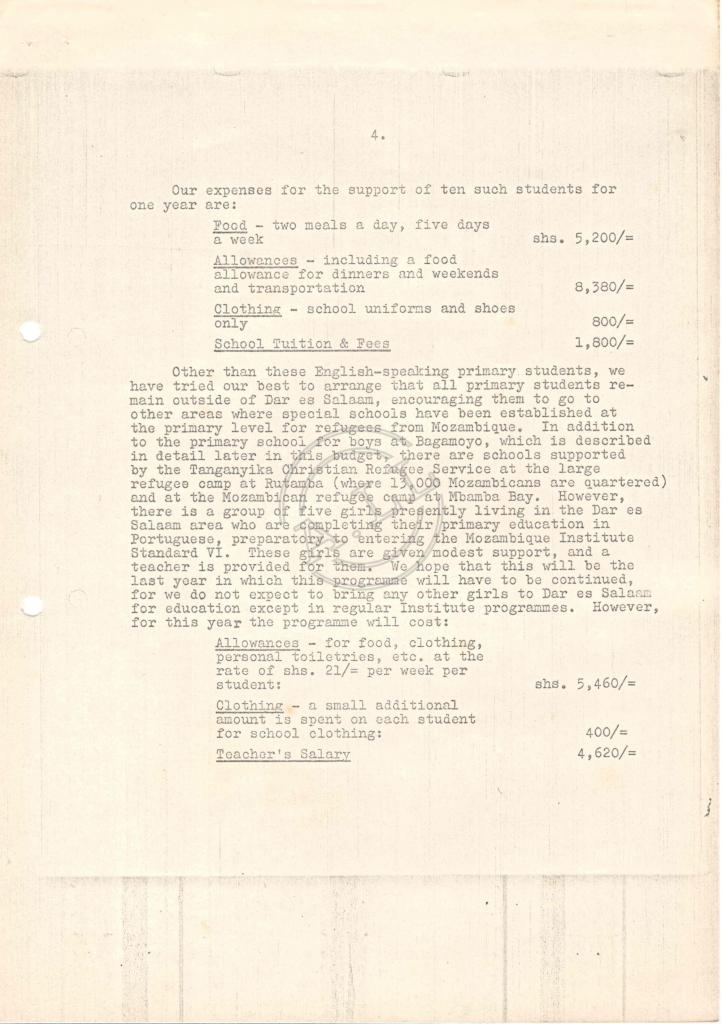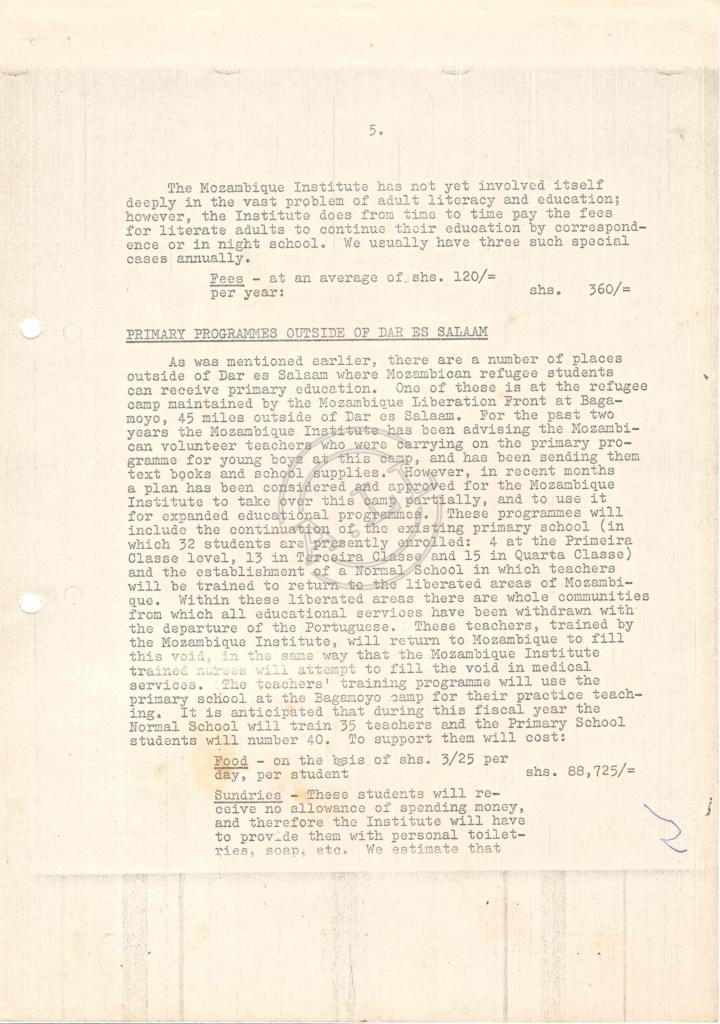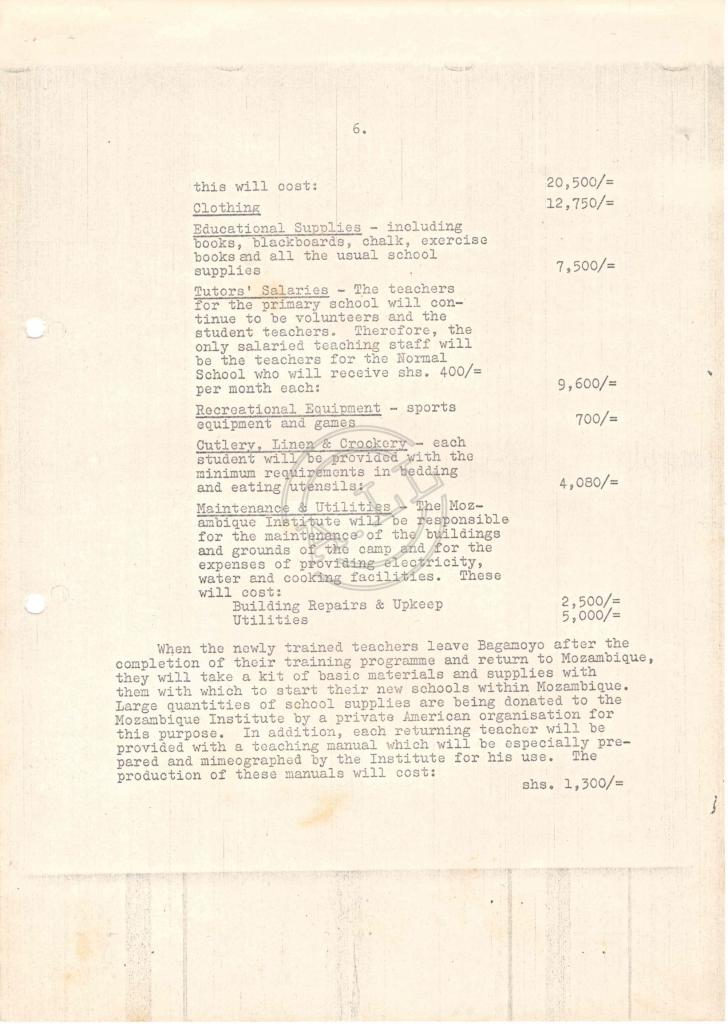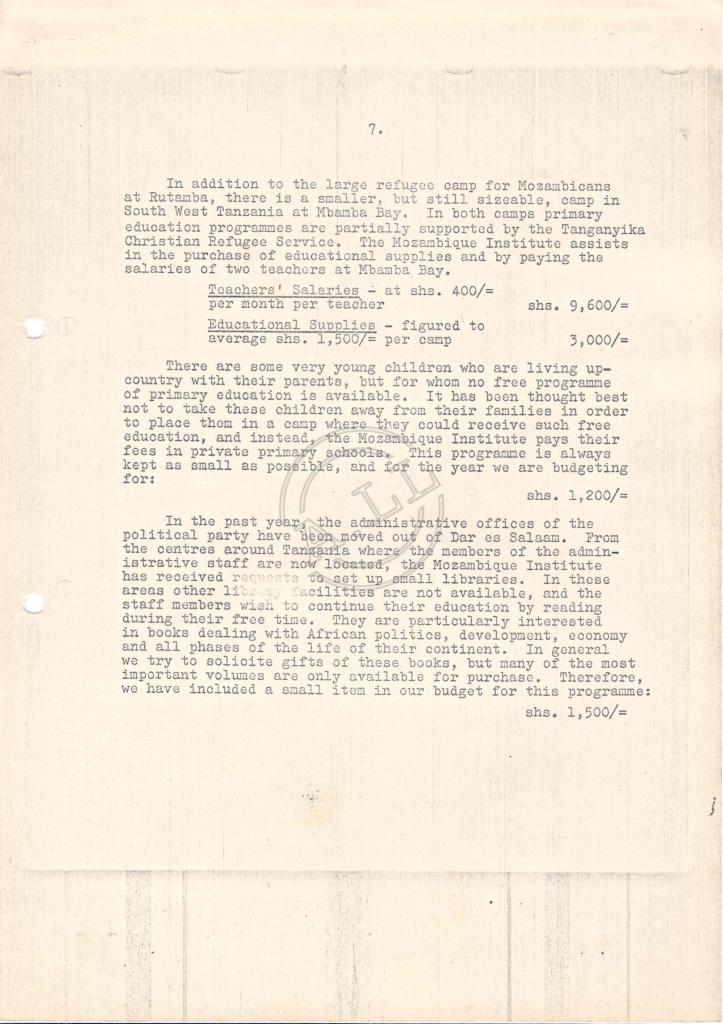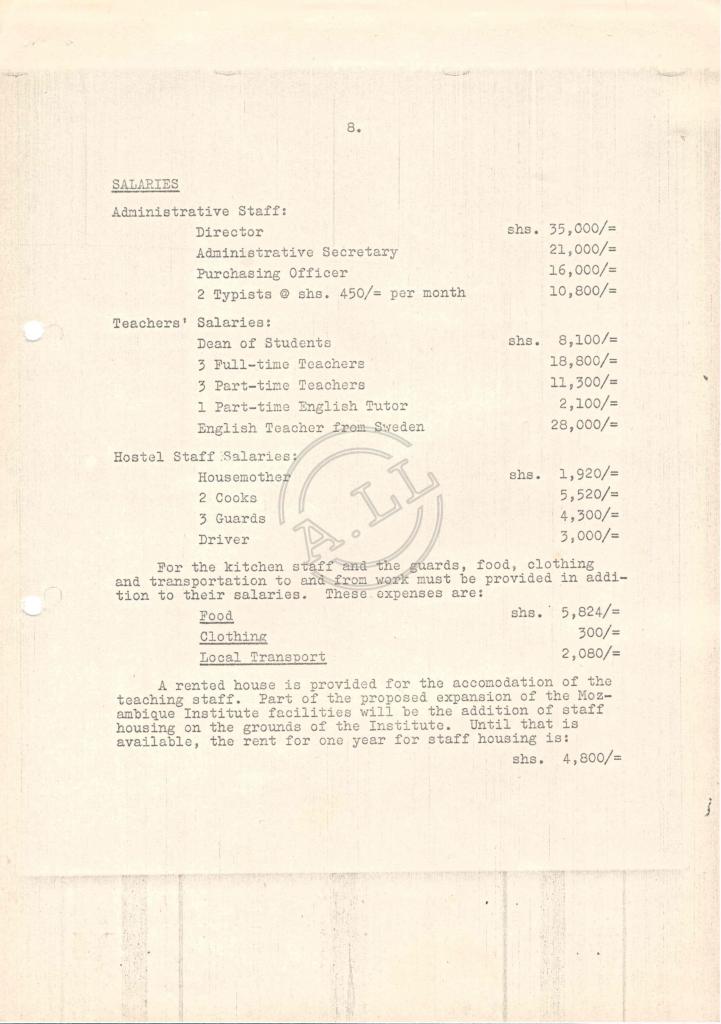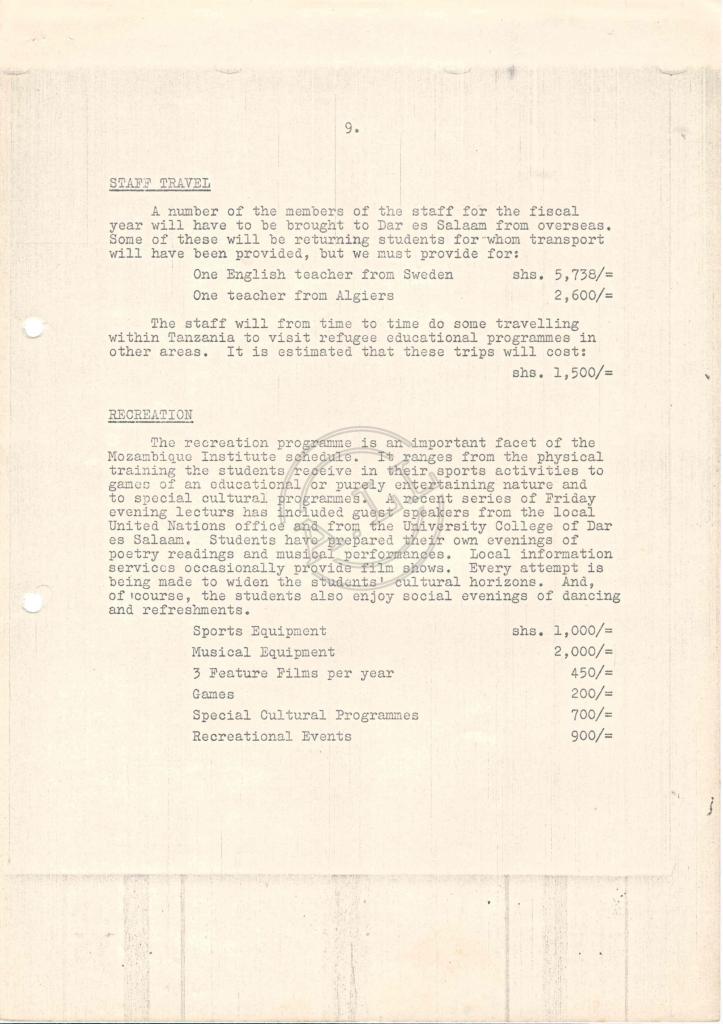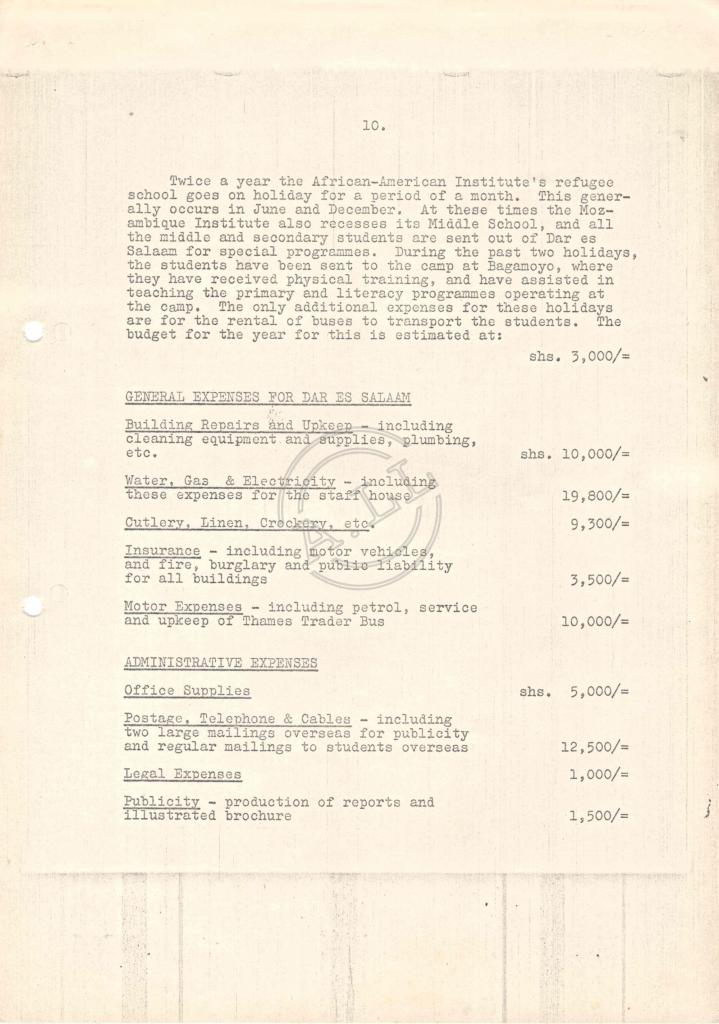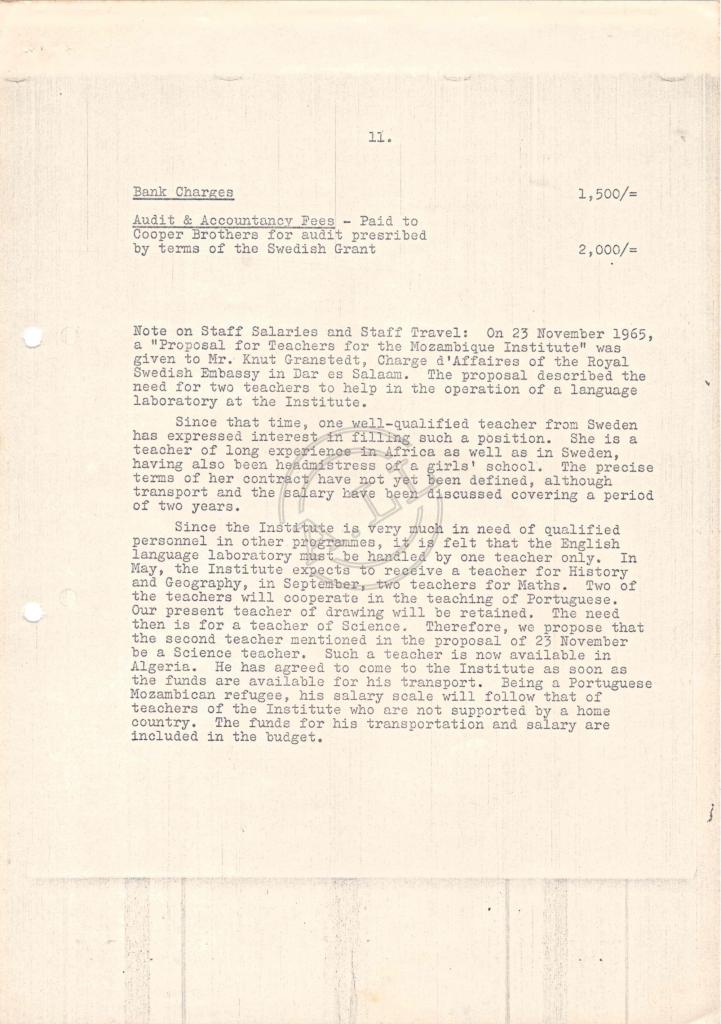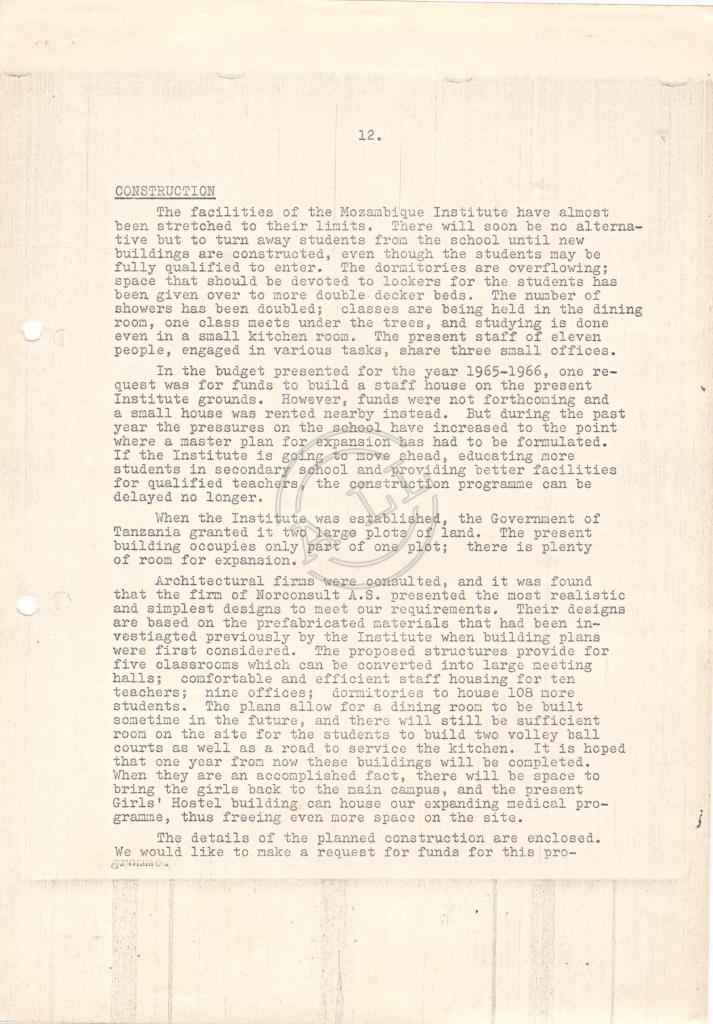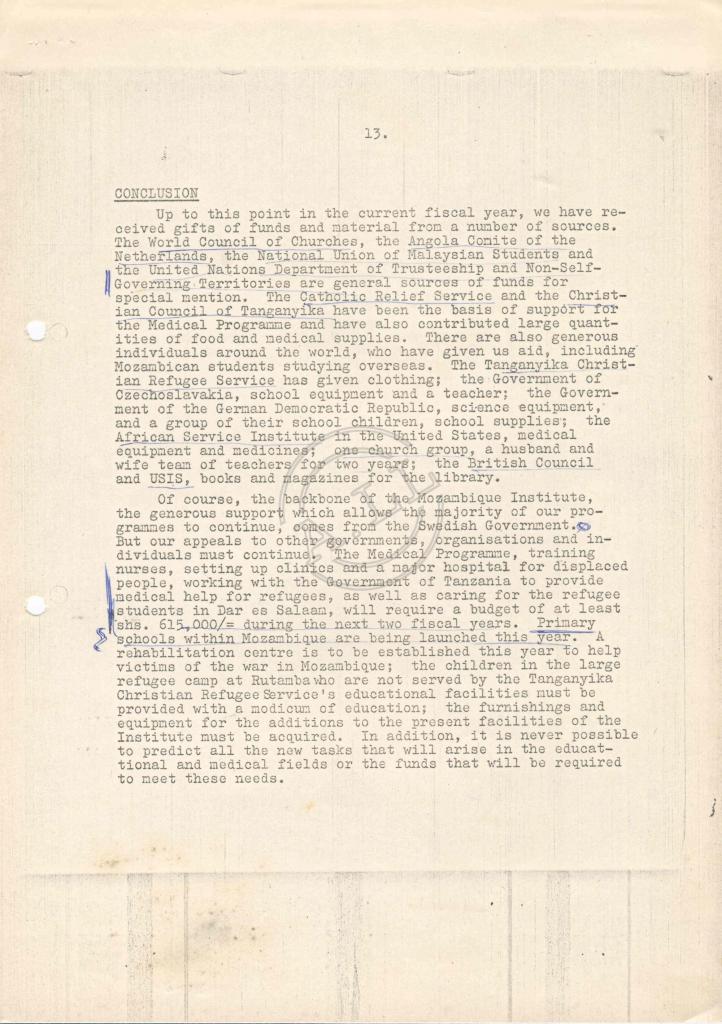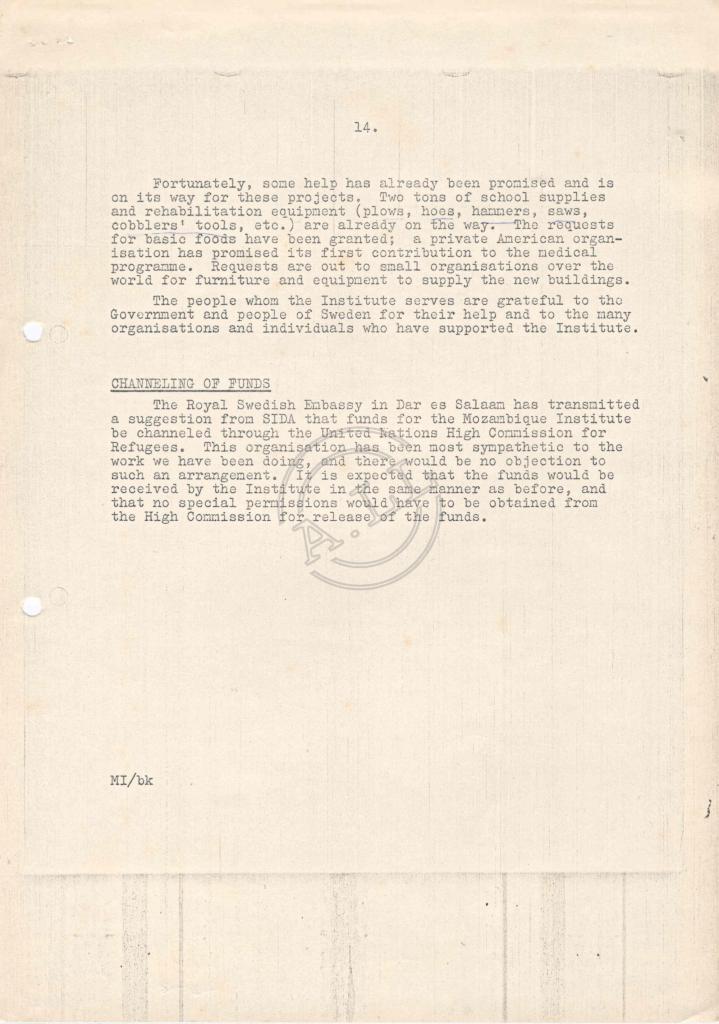Cota
0085.000.008
Tipologia
Texto de Análise
Impressão
Dactilografado
Suporte
Papel Comum
Autor
Janet Mondlane - Mozambique Institute
Locais
Data
1966
Idioma
Conservação
Bom
Fundo
Imagens
15
THE MOZAMBIQUE INSTITUTE
(Instituto Moçambicano)
Janet Rae Mondlane Director
Betty King, Administrative Secretary
P.O. BOX 20773
(CORNER KILWA & KURASINI ROADS)
DAR ES SALAAM,
TANZANIA EAST AFRICA
TELEPHONE: 83266
The Mozambique Institute is beginning its fourth year of life, and those of us who have given birth and nursed it through infancy have every justification for taking pride in the new child. Governments, private organizations and individuals who have supported the Institute can be assured that a strong base has been built upon which much good progress can follow.
The best evidence of the advancements of the Institute can be seen in the lives of its students. They study hard and are healthy; their teachers work hard with them; they know they are “going somewhere” with their studies. Mozambican refugees all over Tanzania have benefited in one way or another from the work of the Institute, and our minds are now turning to the thousands of displaced children who remain within Mozambique, a country where opportunities for schooling have always been minimal, and where now many schools have been stopped altogether. There is still much work to be done, and we hope that, as before, this request will be given thoughtful consideration.
The past year has followed quite closely the outlines which were drawn up a year ago. The request made to the Swedish Government for 1965-1966 was for shs. 334,308/=, of which shs. 275,326/35 was granted. Funds withdrawn from the Swedish Grant during the first five months of this fiscal year are approximately 5/12 of the total request. This year’s request has been drawn up with equal care.
STUDENTS IN DAR ES SALAAM
There are three categories of students studying in Dar es Salaam and resident at the Mozambique Institute: the Middle School includes students studying in Portuguese at the Standard VI, VII and VIII levels; the Nursing Course prepares students to undertake work as nurses aides and is also taught in Portuguese; and the Secondary Programme comprising students who are attending secondary level classes in English at the Kurasini International Education Centre of the African-American Institute. The students in first two groups are supported entirely by the Mozambique Institute, while the secondary students, although they live at the Institute, are clothed, fed and otherwise supported by the African-American Institute.
It is extremely difficult to make accurate estimated of the number of students who will be enrolled in the Mozambique Institute at any time. The Institute is not like an ordinary boarding school which admits new students only once a year and has a fixed capacity. Refugee students come to the Institute whenever they arrive in Dar es Salaam from Mozambique, and it is not possible to say, “Sorry, no vacancies”.
However, in projecting an estimate of the student population for the fiscal year from 1 October 1966 to 30 September 1967, we will have to take into account that even the Mozambique Institute cannot expect to have a limitless capacity to accept new students without expanding its facilities. The largest number of students that our present dormitories can hold is 130, and indications are that this number will be enrolled by the beginning of the 1966-1967 fiscal year. Plans are made for the necessary expansion, and these plans are fully explained in this budget. Taking into consideration the time necessary for the new dormitories and other facilities to be completed, and the fact that the largest increase in students generally occurs in January, we have based our budget on the following estimate of students:
March Sept. Jan.
1996 1966 1967
Middle School 39 48 60
Nurses 16 20 20
KIEC 56 62 86
111 130 166
*KIEC (Kurasini international education center)
Based on this estimate, we anticipate that our expenses for supporting these students will be:
Food - On the basis of our expenses
over the past year, we plan to spend
shs. 4/= per day per student to provide
three nourishing meals per day. shs. 112,064/=
(A considerable saving is included
here as a result of the bulk gifts of maize
meals, bulgar wheat, cooking oil and
milk which we receive regularly
from Catholic Relief Service)
Allowances - Students are given an
allowance of shs. 8/= per week with 32,232/=
which to purchase their own personal
necessities, such as soap, tooth paste,
etc., and for pocket money.
Clothing - In the past we have bought
clothing for the students according to
their individual needs but in some cases
this has led to inequalities and some hard
feelings. Therefore, it has been decided to
follow a policy of giving a student shs. 100/=
in cash upon their arrival at the Institute with
which to purchase clothing and shoes. Thereafter,
every student will receive a further shs. 70/=
every six months. On this basis, clothing expenses
for the Middle School and Nursing Course students
will be: 12,400/=
Educational Supplies - In addition to the usual
supplies, such as exercise books, chalk, pens,
pencils, etc., this budget item also includes any
books which it becomes necessary to purchase
for our programs. We have been extraordinarily
fortunate in the gifts we have received for our library,
and we try to keep our purchases to a minimum. The
books and supplies for the nursing programme
are paid for out of the medical budget; however,
we estimate that our expenses for educational
supplies for the Medical School programme will
be: 5,000/=
(Some economies may be possible in educational
supplies if gifts of school supplies which have been
discussed with certain humanitarian organizations
materialize.)
There is always a certain number of students in residence at the Mozambique Institute who are waiting to go overseas on scholarships either for university education or for technical secondary schools. These students are supported by the Institute during their waiting period, which is sometimes as long as three or four months. While at the Institute, they will either carry on a programme of private study or will frequently help the other students by tutoring them. We estimate that there will always be an average of four of these students-in-waiting at the Institute at all times, and our budget for their support is:
Food - at shs. 4/= per day shs. 5,824/=
Allowances - at shs. 8/= per week 1,664/=
Clothing - for Dar es Salaam 1,000/=
Clothing for Overseas - When the time comes for the
student to depart overseas, he or she is given shs. 300/=
to buy warm clothing and a suitcase in which to transport
personal effects. Most scholarships provide a clothing
allowance for students immediately upon their arrival in
the host country, but it is necessary for them to have a
presentable outfit in which to travel. On the basis of an
estimated total of 30 students leaving for overseas during
the year, these expenses will come to: 9,000/=
Although the program has been kept as small as possible, the Institute has always supported a number of young primary school students in the English-speaking schools in Dar es Salaam. Some of these children are the sons and daughters of refugees who have been outside of Mozambique long enough so that their children’s education begun in English-speaking schools. The majority of the children are displaced orphans. These students cannot be integrated into the Mozambique Institute’s own primary programme because they are either not sufficiently fluent in Portuguese or they are below the Middle School level. They do not live at the Institute’s hostels, but stay with families in and around Dar es Salaam. However, they generally eat breakfast and lunch at the Institute.
Our expenses for the support of ten such students for one year are:
Food - two meals a day, five days a week shs. 5,200/=
Allowances - including a food allowance for dinners
And weekends and transportation 8,380/=
Clothing - school uniforms and shoes only 800/=
School Tuition & Fees - 1,800/=
Other than these English-speaking primary students, we have tried our best to arrange that all primary students remain outside of Dar es Salaam, encouraging them to go to other areas where special schools have been established at the primary level for refugees from Mozambique. In addition to the primary school for boys at Bagamoyo, which is described in detail later in this budget, there are schools supported by the Tanhanyika Christian Refugee Service at the large refugee camp at Rutamba (where 13,000 Mozambicans are quartered) and the Mozambican refugee camp at Mbamba Bay. However, there is a group of five girls presently living in the Dar es Salaam area who are completing their primary education in Portuguese, preparatory to enter the Mozambique Institute Standard VI. These girls are given modest support, and a teacher is provided for them. We hope that this will be the las year in which this programme will have to be continued, for we do not expect to bring any other girls to Dar es Salaam for education except in regular Institute programs. However, for this year the programme will cost:
Allowances - for food, clothing, personal toiletries, etc. at the rate of shs. 21/= per
week per student: shs. 5,460/=
Clothing - a small additional amount is spent
On each student for school clothing: 400/=
Teacher’s salary 4,620/=
The Mozambique Institute has not yet involved itself deeply in the vast problem of adult literacy and education; however, the Institute does from time to time pay the fees for literate adults to continue their education by correspondence or in night school. We usually have three such special cases annually.
Fees - at an average of shs. 120/= per year: shs. 3607=
PRIMARY PROGRAMS OUTSIDE OF DAR ES SALAAM
As was mentioned earlier, there are a number of places outside of Dar es Salaam where Mozambican refugee students can receive primary education. One of these is at the refugee camp maintained by the Mozambique Liberation Front at Bagamoyo, 45 miles outside of Dar es Salaam. For the past two years the Mozambique Institute has been advising the Mozambican volunteer teachers who were carrying on the primary programme for young boys at this camp, and has been sending them text books and school supplies. However, in recent months a plan has been considered and approved for the Mozambique Institute to take over this camp partially, and use it for expanded educational programs. These programs will include the continuation of the existing primary school (in which 32 students are presently enrolled: 4 at the Primeira Classe level, 13 in Terceira Classe and 15 in Quarta Classe) and the establishment of a Normal School in which teachers will be trained to return to the liberated areas of Mozambique. Within these liberated areas there are whole communities from which all educational services have bee withdrawn with the departure of the Portuguese. These teachers, trained by the Mozambique Institute, will return to Mozambique to fill this void, in the same way that the Mozambique Institute trained nurses will attempt to fill the void in medical services. The teachers’ training programme will use the primary school at the Bagamoyo camp for their practice teaching. It is anticipated that during this fiscal year the Normal School will train 35 teachers and the Primary School students will number 40. To support them will cost:
Food - on the basis of shs. 3/25 per day, per student shs. 88,725/=
Sundries - These students will receive no allowance
of spending money, and therefore the Institute will
have to provide them with personal toiletries, soap,
etc. We estimate that this will cost: 20,500/=
Clothing 12,750/=
Educational Supplies - including books, blackboards,
chalk, exercise books and all the usual school supplies 7,500/=
Tutors’ Salaries - The teachers for the primary school
will continue to be volunteers and the students’ teachers.
Therefore, the only salaried teaching staff will be the
teachers for the Normal School who will receive shs. 400/=
per month each: 9,600/=
Recreational Equipment - sports equipment and games 700/=
Cutlery, Linen & Crockery - each student will be provided
with the minimum requirements in the bedding and
eating utensils: 4,080/=
Maintenance & Utilities - The Mozambique Institute will
be responsible for the maintenance of the buildings and
grounds of the camp and for the expenses of providing
electricity, water and cooking facilities. These will cost:
Building Repairs & Upkeep 2,500/=
Utilities 5,000/=
When the newly trained teachers leave Bagamoyo after the completion of their training programme and return to Mozambique, they will take a kit of basic materials and supplies with them with which to start their new schools within Mozambique. Large quantities of school supplies are being donated to the Mozambique Institute by a private American organization for this purpose. In addition, each returning teacher will be provided with a teaching manual which will be specially prepared and mimeographed by the Institute for his use. The production of these manuals will cost: shs. 1,300/=
In addition to the large refugee camp for Mozambicans at Rutamba, there is a smaller, but still sizeable, camp in South West Tanzania at Mbamba Bay. In both camps primary education programs are partially supported by the Tanganyika Christian Refugee Service. The Mozambique Institute assists in the purchase of educational supplies and by paying the salaries of two teachers at Mbamba Bay.
Teachers’ Salaries - at shs. 400/= per month per Teacher shs. 9,600/=
Educational Supplies - figured to average shs. 1,500/= Per camp 3,000/=
There are some very young children who are living upcountry with their parents, but for whom no free programme of primary education is available. It has been thought best no to take these children away from their families in order to place them in a camp where they could receive such free education, and instead, the Mozambique Institute pays their fees in private primary schools. This programme is always kept as small as possible, and for the year we are budgeting for: shs. 1,200/=
In the past year, the administrative offices of the political party have been moved out of Dar es Salaam. From the centres around Tanzania where the members of the administrative staff are now located, the Mozambique Institute has received requests to set up small libraries. In these areas other library facilities are not available, and the staff members wish to continue their education by reading during their free time. They are particularly interested in books dealing with African politics, development, economy and all phases of life of their continent. In general we try to solicite gifts of these books, but many of most important volumes are only available for purchase. Therefore, we have included a small item in our budget for this programme: shs. 1,500/=
SALARIES
Administrative Staff:
Director shs. 35,000/=
Administrative Secretary 21,000/=
Purchasing Officer 16,000/=
2 Typist @ shs. 450/= per month 10,800/=
Teachers’ Salaries:
Dean of Students shs. 8,100/=
3 Full-time Teachers 18,800/=
3 Part-time Teachers 11,300/=
1 Part-time English Tutor 2,100/=
English Teacher from Sweden 28,000/=
Hostel Staff Salaries:
Housemother shs. 1,920/=
2 Cooks 5,520/=
3 Guards 4,300/=
Driver 3,000/=
For the kitchen staff and the guards, food, clothing and transportation to and from work must be provided in addition to their salaries. These expenses are:
Food shs. 1,920/=
Clothing 5,520/=
Local Transport 2,080/=
A rented house is provided for the accommodation of the teaching staff. Part of the proposed expansion of the Mozambique Institute facilities will be the addition of staff housing on the grounds of the Institute. Until that is available, the rent for one year of staff housing is: shs. 4,800/=
STAFF TRAVEL
A number of members of the staff for the fiscal year will have to be brought to Dar es Salaam from overseas. Some of these will be returning students from whom transport will have been provided, but we must provide for:
One English teacher from Sweden shs. 5,738/=
One teacher from Algiers 2,600/=
The staff will from time to time do some travelling within Tanzania to visit a refugee educational programme in other areas. It is estimated that these trips will cost: shs. 1,500/=
RECREATION
The recreation programme is an important facet of the Mozambique Institute schedule. It ranges from physical training the students receive in their sports activities to games of an educational or purely entertaining nature and to special cultural programs. A recent series of Friday evening lectures has included guest speakers from the local United Nations office and from the University College of Dar es Salaam. Students have prepared their own evenings of poetry readings and musical performances. Local information services occasionally provide film shows. Every attempt is being made to widen the students’ cultural horizons. And, of course, the students also enjoy social evenings of dancing and refreshments.
Sports Equipment shs. 1,000/=
Musical Equipment 2,000/=
3 Feature Filmes per year 450/=
Games 200/=
Special Cultural Programs 700/=
Recreational Events 900/=
Twice a year the African-American Institute’s refugee school goes on holiday for a period of a month. This generally occurs in June and December. At these times the Mozambique Institute also Recesses its Middle School, and all the middle and secondary students are sent out of Dar es Salaam for special programs. During the past two holidays, the students have been sent to the camp at Bagamoyo, where they have received physical training, and have assisted in teaching the primary and literacy programs operating at the camp. The only additional expenses for these holidays are for the rental of buses to transport the students. The budget for the year for this is estimated at: shs. 3,000/=
GENERAL EXPENSES FOR DAR ES SALAAM
Building Repairs and Upkeep - including cleaning equipment
and supplies, plumbing etc. shs. 10,000/=
Water, Gas & Electricity - including these expenses for the
staff house 19,800/=
Cutlery, Linen; Crockery; etc. 9,300/=
Insurance - including motor vehicles, and fire, burglary and
public liability for all buildings 3,500/=
Motor Expenses - Including petrol, service and upkeep of
Thames Trader Bus 10,000/=
ADMINISTRATIVE EXPENSES
Office Supplies shs. 5,000/=
Postage, Telephone & Cables - including two large mailings
overseas for publicity and regular mailings to students overseas 12,500/=
Legal Expenses 1,000/=
Publicity - production of reports and illustrated brochure 1,500/=
Bank Charges 1,500/=
Audit & Accountancy Fees - Paid to Cooper Brothers for
Audit prescribed by terms of the Swedish Grant 2,000/=
Note on Staff Salaries and Staff Travel: On 23 November 1965 a “Proposal for Teachers for the Mozambique Institute” was given to Mr. Knut Granstedt, Charge d’Affraires of the Royal Swedish Embassy in Dar es Salaam. The proposal described the need for two teachers to help in the operation of a language laboratory at the Institute.
Since that time, one well-qualified teacher from Sweden has expressed interest in filling such a position. She is a teacher of long experience in Africa as well as in Sweden, having also been headmistress of a girls’ school. The precise terms of her contract have not yet been denied, although transport and the salary have been discussed covering a period of two years.
Since the Institute is very much in need of qualified personnel in other programs, it is felt that the English language laboratory must be handled by one teacher only. In May, the Institute expects to receive a teacher for History and Geography in September, two teachers for Maths. Two of the teachers will cooperate in the teaching of Portuguese. Our present teacher of drawing will be retained. The need then is for a teacher of Science. Therefore, we propose that the second teacher mentioned in the proposal of 23 November be a Science teacher. Such a teacher in now available in Algeria. He has agreed to come to the Institute as soon as the funds are available for his transport. Being a Portuguese Mozambican refugee, his salary scale will follow that of teachers of the Institute who are not supported by a home country. The funds for his transportation and salary are included in the budget.
CONSTRUCTION
The facilities os the Mozambique Institute have almost been stretched to their limits. There will soon be no alternative but to turn away students from the school until new buildings are constructed, even though the students may be fully qualified to enter. The dormitories are overflowing; space that should be devoted to lockers for the students has been given over to more double decker beds. The number of showers has been doubled; classes are being held in the dining room, one class meets under the trees, and studying is done even in a small kitchen room. The present staff of eleven people, engaged in various tasks, share three small offices.
In the budget presented for the year 1965-1966, one request was for funds to build a staff house on the present Institute grounds. However, funds were not forthcoming and a small house was rented nearby instead. But during the past year the pressures on the school have increased to the point where a master plan for expansion has had to be formulated. If the Institute is going to move ahead, educating more students in secondary school and providing better facilities for qualified teachers, the construction programme can be delayed no longer.
When the Institute was established, the Government of Tanzania granted it two large plots of land. The present building occupies only part of one plot; there is plenty of room for expansion.
Architectural firms were consulted, and it was found that the firm of Norconsult A.S. presented the most realistic and simplest designs to meet our requirements. Their designs are based on the prefabricated materials that has been investigated previously by the Institute when building plans were first considered. The proposed structures provide for five classrooms which can be converted into large meeting halls; comfortable and efficient staff housing for ten teachers; nine offices; dormitories to house 108 more students. The plans allow for a dining room to be built sometime in the future, and there will still be sufficient room on the side for the students to build two volley ball courts as well as a road to service the kitchen. It is hoped that one year from now these buildings will be completed. When they are an accomplished fact, there will be be space to bring the girls back to the main campus, and the present Girls’ Hostel building can house our expanding medical programme, thus freeing even more space on the site.
The details of the planned construction are enclosed. We would like to make a request for funds for this programme.
CONCLUSION
Up to this point in the current fiscal year, we have received gifts for funds and material from a number of sources. The World Council of Churches, the Angola Committee of the Netherlands, the National Union of Malaysian Students and the United Nations Department of Trusteeship and Non-Self-Governing Territories are general sources of funds for special mention. The Catholic Relief Service and the Christian Council of Tanganyika have been the basis of support for the Medical Programme and have also contributed large quantities of food and medical supplies. There are also generous individuals around the world, who have given us aid, including Mozambican students studying overseas. The Tanganyika Christian Refugee Service has given clothing; the Government of Czechoslovakia, school equipment and a teacher; the Government of the German Democratic Republic, science equipment, and a group of their school children, school supplies; the African Service Institute in the United States, medical equipment and medicines; one church group, a husband and a wife team teachers for two years; the British Council and USIS, books and magazines for the library.
Of course, the backbone of the Mozambique Institute, the generous support which allows the majority of our programs to continue, comes from the Swedish Government. But our appeals to other governments, organizations and individuals must continue. The Medical Programme, training nurses, setting up clinics and a major hospital for displaced people, working with the Government of Tanzania to provide medical help for refugees, as well as caring for the refugee students in Dar es Salaam, will require a budget of at least shs. 615,000/= during the next two fiscal years. Primary schools within Mozambique are being launched this year. A rehabilitation centre is to be established this year to help victims of war in Mozambique; the children in the large refugee camp at Rutamba who are not served by the Tanganyika Christian Refugee Service’s educational facilities must be provided with a modicum of education; the furnishings and equipment for the additions to the present facilities of the Institute must be acquired. In addition, it is the educational and medical fields or the funds that will be required to meet these needs.
Fortunately, some help has already been promised and is on its way for these projects. Two tons of school supplies and rehabilitation equipment (plows, hoes, hammers, saws, cobblers’ tools, etc.) are already on the way. The requests for basic foods have been granted; a private American organization has been promised its first contribution to the medical programme. Requests are out to small organizations over the world for furniture and equipment to supply the new buildings.
The people whom the Institute serves are grateful to the Government and people of the Sweden for their help and to the many organizations and individuals who have been supported the Institute.
CHANNELING OF FUNDS
The Royal Swedish Embassy in Dar es Salaam has transmitted a suggestion from SIDA that funds for the Mozambique Institute be channelled through the United Nations High Commission for the work we have been doing, and there would be no objection to such an arrangement. It is expected that the funds would be received by the Institute in the same manner as before, and that no special permissions would have to be obtained from the High Commission for release of the funds.
MI/bk
Fotocópia de um Documento do Mozambique Institute, de Janet Mondlane (Anexo II)
A publicação, total ou parcial, deste documento exige prévia autorização da entidade detentora.
